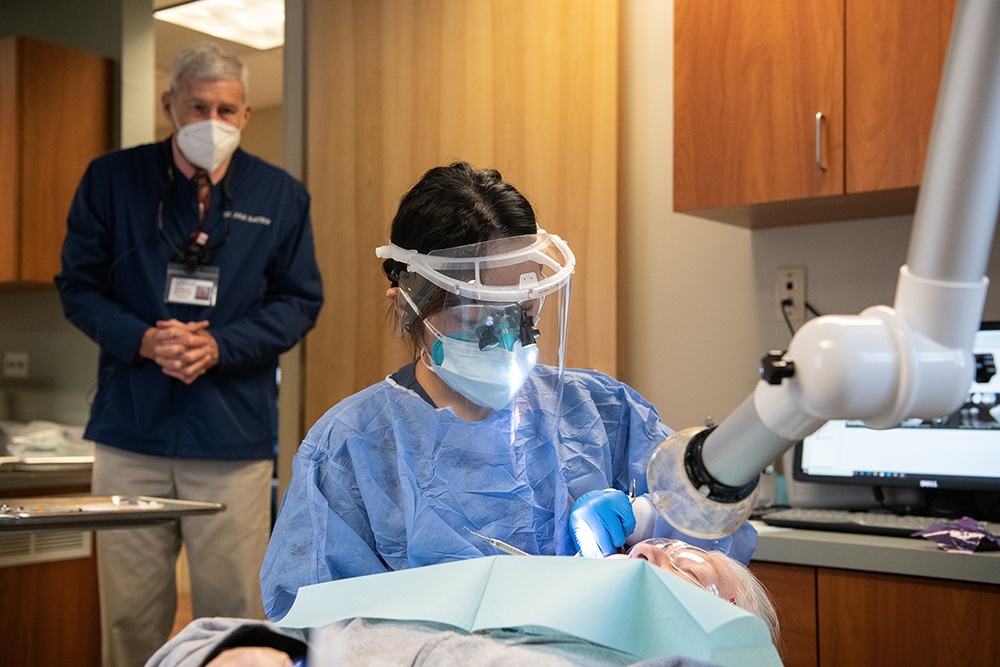Two-Year Degree Program Students Reflect on Challenges, Achievements as They Graduate
May 18, 2022 Jen Badie
Dentistry and nursing students say they feel pride in all they’ve accomplished and are thankful for their time at UMB.
Fear, uncertainty, the unknown. Many University of Maryland, Baltimore (UMB) students have dealt with those emotions for the past two years during the ups and downs of the COVID-19 pandemic. But one group of students has faced perhaps an even more unusual circumstance: They are earning two-year degrees, so the pandemic has been a part of their entire time studying and training at UMB.
UMB offers numerous two-year programs such as the Bachelor of Science Dental Hygiene and Advanced Education in General Dentistry (AEGD) programs at the University of Maryland School of Dentistry (UMSOD) and the Bachelor of Science in Nursing Program at the University of Maryland School of Nursing.
Some students in those programs said they faced challenges from the pandemic even before arriving at UMB in fall 2020. For instance, Hee Yeon Kim, who is completing the dental hygiene program, said the pandemic indefinitely postponed her permanent residency interview.
“When the pandemic first hit, I thought it would last about six months. However, things escalated quickly, and my permanent residency interview was canceled by U.S. Citizenship and Immigration Services due to the pandemic,” she said. “I had been counting on becoming a permanent resident for UMB to consider me to be an in-state student, so I thought I would have to give up the admission for at least a year. Thankfully, UMB granted me in-state status, so I was able to pursue my dream without delay.”
Max O’Sullivan, who was an active member of the Navy for 12 years before coming to UMB and will graduate with a Bachelor of Science in Nursing degree, was working at a military trauma center in North Carolina when the pandemic started.
“Moving here was stressful on my wife because of the military restrictions: I couldn’t leave our duty station. She had to come look at a house with her mom in Maryland, and I was not able to come, so that was the first challenge,” he said. “The second challenge was we moved here at 24 weeks’ pregnant expecting our first child, so there was kind of fear of the unknown coming into a new place.”
Challenges and Positives of Online Learning
Once at UMB, the challenges continued when the academic year got under way in fall 2020 since many classes had to be offered online.
“It has been very frustrating. With my military experience, nursing is very hands-on: You learn by doing, being in person, engaging with people, patients, instructors,” O’Sullivan said. “So for me, not having that was actually a very big challenge. As far as coursework, imagine taking the hardest courses you’ve ever taken, and doing it through Zoom.”
Kim saw the bright side of online classes: “I loved waking up five minutes before my lectures for the didactic courses and wearing my fuzzy socks all day. Professors were attentive to the students’ needs and kept us encouraged,” she said.
As the pandemic wore on, these students were able to get hands-on instruction working in clinics and the hospital, though Venkata Ratna Kumar Rudravaram, DDS, a resident in UMSOD’s AEGD program, said he felt uncertainty when working in the AEGD clinic.
“It was hard to communicate with patients. I struggled to get used to wearing respirators and surgical masks,” he said. “Patients were scared and apprehensive to make dental appointments, and I was also worried about going to school and getting sick. It was a very uncertain time, and that was a big obstacle to overcome.”
He added, “UMB did an amazing job providing all health care providers with COVID vaccinations at the very beginning and providing extra protection.”
Read more at CATALYST magazine.
You can read the Spring 2022 issue of CATALYST magazine, which highlights the incredible work done by School of Medicine scientists and clinicians who successfully transplanted a genetically modified pig heart in a patient who survived for two months. We also share stories about Gregory F. Ball, the new vice president for research; Wendy Shaia, executive director of the School of Social Work’s Social Work Community Outreach Service; the UMB CURE Scholars Program’s first cohort going to college; the 50th anniversary of the School of Pharmacy’s Maryland Poison Center; and much, much more!